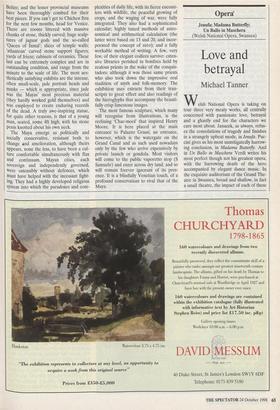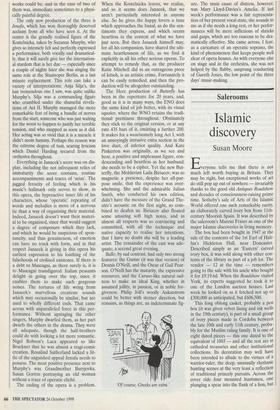Opera'
Jenufa; Madams Butterfly; Un Ballo in Maschera (Welsh National Opera, Swansea)
Love and betrayal
Michael Tanner
Welsh National Opera is taking on tour three very meaty works, all centrally concerned with passionate love, betrayal and a ghastly end for the characters we care most about. Janacek, as always, refus- es the consolations of tragedy and finishes in a strangely upbeat mode, in Jenufa. Puc- cini gives us his most unmitigatedly harrow- ing conclusion, in Madama Butterfly. And in Un Ballo in Maschera Verdi writes his most perfect though not his greatest opera, with the harrowing death of the hero accompanied by elegant dance music. In the exquisite auditorium of the Grand The- atre in Swansea, broad and shallow, in fact a small theatre, the impact of each of these works could be, and in the case of two of them was, immediate sometimes to a physi- cally painful degree.
The only new production of the three is Jenufa, which has won thoroughly deserved acclaim from all who have seen it. At the centre is the grandly realised figure of the Kostelnicka, taken by Suzanne Murphy, who gives so intensely felt and perfectly expressed a performance, both vocally and dramatical- ly, that it will surely give her the internation- al stardom that is her due — especially since a couple of nights later she was singing the same role at the Staatsoper Berlin, as a last minute replacement. This role can take a variety of interpretations; Anja Silja's, the last tremendous one I saw, was quite unlike Murphy's. Silja was a commanding figure who crumbled under the shameful revela- tions of Act II. Murphy managed the more remarkable feat of being a bundle of nerves from the start, someone who was just waiting for the worst to happen to justify her terrible tension, and who snapped as soon as it did. Her acting was so vivid that it is a miracle it didn't seem hammy. Perhaps the reason was the extreme degree of taut, searing lyricism which Daniel Harding secured from the orchestra throughout.
Everything in Janacek's score was on dis- play, including the not infrequent relics of immaturity the score contains, routine accompaniments and traces of 'arias'. The jagged ferocity of feeling which is his music's hallmark only serves to show, in this opera, the hyperactive inner life of his characters, whose `operatic' repeating of words and melodies is more of a nervous tic than a way of organising their material. Indeed, Janacek doesn't want their materi- al to be organised, since that would suggest a degree of composure which they lack, and which he would be suspicious of: spon- taneity, and thus genuineness, of emotion can have no truck with form, and in that respect Janacek is giving in this opera his earliest expression to his loathing of the falsehoods of civilised existence. If there is a debt to Mascagni, as there surely is, it is to Mascagni transfigured. Italian peasants delight in going over the top, since it enables them to make such gorgeous noises. The tortures of life wring from Janacek's marvellous creations sounds which may occasionally be similar, but are used to wholly different ends. That came across with unparalleled force in this per- formance. Without upstaging the other singers, Murphy dwarfed them, as her part dwarfs the others in the drama. They were all adequate, though the half-brothers could do with looking a lot more romantic. Nigel Robson's Laca appeared so like Bruckner that he was almost a tragi-comic creation. Rosalind Sutherland lacked a lit- tle of the anguished appeal Jenufa needs to possess. The most positive presence next to Murphy's was Grandmother Buryjovka, Susan Gorton portraying an old woman without a trace of operatic cliché.
The ending of the opera is a problem. When the Kostelnicka leaves, we realise, and so it seems does Janacek, that we aren't particularly interested in anyone else. So he gives the happy lovers a tune which approaches the banal, as do the sen- timents they express, and which seems heartless in the context of what we have just seen. But then Janacek himself may, for all his compassion, have shared the ulti- mate heartlessness of life, as we find it explicitly in all his other serious operas. To attempt to remedy that, as the producer Katie Mitchell did in an outrageous piece of kitsch, is an artistic crime. Fortunately it can be easily remedied, and then the pro- duction will be altogether outstanding.
The Herz production of Butterfly has been in the repertoire for 20 years, and, good as it is in many ways, the ENO does the same kind of job better, with its visual squalor, where the WNO retains the tradi- tional prettiness throughout. Obstinately they stick to the original version, or at any rate 435 bars of it, omitting a further 200. It makes for a wearisomely long Act I, with an annoyingly intrusive extra section in the love duet, of inferior quality. And Kate Pinkerton was originally, as we see and hear, a positive and unpleasant figure, con- descending and heartless as her husband; she needs to be a cipher. Yet the new But- terfly, the Moldavian Lada Biriucov, was so magnetic a presence, despite her all-pur- pose smile, that the experience was over- whelming. She and the admirable Julian Smith, who conducted his own edition, didn't have the measure of the Grand The- atre's acoustic on the first night, so com- bined to deafen us. Biriucov also floated some amazing soft high notes, and in almost all respects was so convincing and committed, with all the technique and native capacity to realise her intentions, that I have no doubt she will be a leading artist. The remainder of the cast was ade- quate; a second great evening.
Ballo, by sad contrast, had only two strong features: the Gustav (it was that version) of Dennis O'Neill, and the Oscar of Gail Pear- son. O'Neill has the maturity, the expressive resources, and the Caruso-like natural sad- ness to make an ideal King, whether in assumed jollity, in passion, or in noble for- giveness. Philip Joll's woolly Ankarstrom could be better with sterner direction, but remains, as things are, an indeterminate fig- 'Of course, Greeks are extra.' ure. The main cause of distress, however, was Mary Lloyd-Davies's Amelia. If last week's performance was a fair representa- tion of her present vocal state, she sounds to me as if she needs a long rest, or her perfor- mances will be mere inflictions of shrieks and gasps, which are too raucous to be dra- matically effective. She came across, I fear, as a caricature of an operatic soprano, the kind of phenomenon that keeps people well clear of opera houses. As with everyone else on stage and in the orchestra, she was not helped by the flabby, unsprung conducting of Gareth Jones, the low point of the three days' music-making.



















































































 Previous page
Previous page